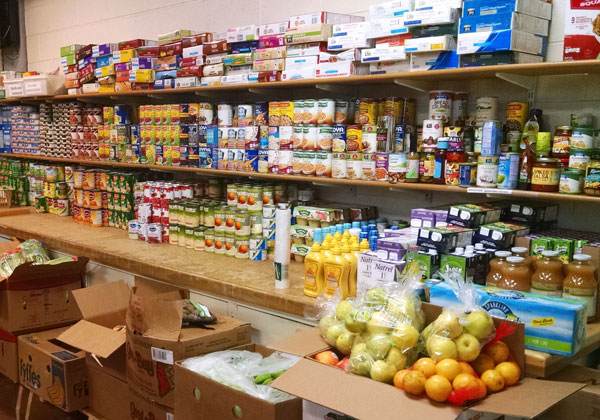Why Supporting Your Neighborhood Food Pantry Is Critical for Helping Those in Requirement
The importance of supporting local food pantries can not be overemphasized, especially in the context of food instability, which impacts a disconcerting number of individuals and households within our areas. As we discover the multifaceted role of food kitchens, it ends up being evident that their impact prolongs far past just distributing food.
Comprehending Food Insecurity
Food instability affects roughly 10.5% of houses in the United States, illustrating a considerable public health and wellness concern that goes beyond plain cravings. It refers to the absence of regular access to sufficient food for an active, healthy life. This problem can bring about a range of unfavorable outcomes, including poor health and wellness, increased health care prices, and diminished scholastic performance amongst youngsters.
The root causes of food insecurity are multifaceted, frequently stemming from economic factors such as unemployment, destitution, and underemployment. Geographic area can also play an important role, with food deserts-- locations with restricted access to budget friendly and nutritious food-- aggravating the issue - Food Pantry Lockhart. In addition, systemic variables, including social and racial injustices, add to the disproportionate impact of food instability on marginalized communities
Dealing with food insecurity is not just about boosting food supply; it calls for a comprehensive strategy that encompasses economic security, education and learning, and neighborhood support. Food insecurity not only affects specific wellness but also has more comprehensive effects for societal health and wellness and performance. Understanding its intricacy is necessary for developing efficient interventions and fostering long-lasting services that ensure all people have reliable access to nourishing food.
The Duty of Food Pantries
Local food kitchens function as crucial lifelines for people and households facing food instability. They supply important food products to those that may have a hard time to afford ample nourishment as a result of financial hardship, unemployment, or unpredicted scenarios. By distributing food at no charge, these organizations help minimize appetite and protect against the unfavorable health and wellness influences related to insufficient diet plans.
Food cupboards commonly companion with local farms, grocery store stores, and area organizations to source a variety of healthy food things, consisting of fresh produce, milk, and healthy proteins. This partnership makes certain that kitchen clients receive not just nutrition yet also healthier alternatives that contribute to overall health.
Furthermore, food cupboards act as area centers, cultivating links amongst homeowners and giving a feeling of self-respect to those in demand. Lots of kitchens provide additional sources, such as nutrition education and referrals to social services, assisting clients browse their difficulties better.
Fundamentally, food pantries play a complex function in combating food insecurity. They not just address immediate appetite but also encourage families and people to enhance their conditions, thereby advertising area strength and cohesion.

Advantages of Sustaining Food Pantries

Supporting food cupboards not only nourishes those in demand but also strengthens the fabric of the neighborhood. By supplying important food sources, food pantries ease hunger and lower food instability, which is critical for the health and well-being of families and individuals. Accessibility to nourishing food adds to improved physical health, far better academic results for kids, and enhanced mental health and wellness, consequently cultivating a much more effective and engaged community.
Furthermore, sustaining food cupboards advertises social communication. These companies work as hubs for neighborhood engagement, combining volunteers, benefactors, and recipients in a shared mission to fight cravings. This collaboration can break down barriers, foster understanding, and build partnerships amongst diverse area participants.
Additionally, donations to food pantries, whether in the form of food, funds, or time, promote the regional economy. Numerous food cupboards prioritize sourcing from here neighborhood producers, thus sustaining local agriculture and companies. This develops a cycle of assistance that benefits not only those in requirement but the neighborhood overall.
Just How to Get Involved
Interaction with food cupboards can take several kinds, permitting people and groups to make a purposeful influence in their areas. One of one of the most straight methods to obtain included is by contributing food items. Non-perishable products such as canned products, pasta, and rice are constantly sought after. Monetary contributions are likewise very useful, as they allow food kitchens to purchase fresh produce and vital supplies.
Offering your time is an additional impactful means to sustain neighborhood food kitchens (Food Pantry Lockhart). In enhancement, consider arranging food drives within your office, area, or school team to raise check here awareness and collect sources.
Collaborations with local businesses can further improve support for food cupboards. By taking these people, steps and teams can considerably strengthen the efforts of regional food pantries and aid those in need.
Community Impact and Link
Recognizing the extensive impact of food pantries on area well-being is vital for fostering a spirit of connection and partnership. Food cupboards serve not only as important sources for those facing food insecurity but additionally as hubs for neighborhood engagement. They combine diverse groups-- clients, volunteers, and contributors-- producing an atmosphere where individuals can sustain and link each other.
The impact of food cupboards expands beyond mere arrangement of food; they offer as a catalyst for social communication. By joining cupboard initiatives, neighborhood participants can establish connections that go beyond socioeconomic barriers. This network of support helps to take down the preconception often connected with food assistance, promoting an atmosphere of approval and understanding.
As individuals join in their initiatives to sustain local food kitchens, they grow a feeling of common purpose and responsibility, strengthening the idea that everyone you can check here has a role to play in making certain that no one goes starving. Ultimately, sustaining food kitchens reinforces the textile of the area as a whole.
Verdict
Supporting neighborhood food kitchens is necessary in combating food insecurity and improving the health of vulnerable populations. Interaction with food kitchens promotes neighborhood connections, advertising social communication and equity.
